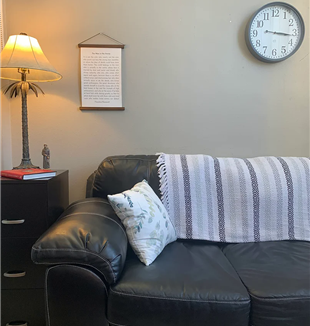
To Accompany and to Follow
In the midst of a challenging moment at work, Erin discovers a new creativity and freedom.I am a high school counselor. Day after day, I see students with a variety of problems, which range from simple teenage stressors to severe mental illness and the devastating effects of childhood trauma. I often fight against an innate desire to “fix” them or make things “better” for them. I must fight this urge because, in truth, they are never really in my control to “fix” or within my ability to “make better”. Instead, I try to accompany them in their struggles and, oftentimes, accompany them as very real signs of Christ in my own life.
Over the past several weeks, there have been significant and stressful events within the high school’s structure. These events, although exhausting and disheartening, have been a path for me to refocus my lens and recognize this call to simply accompany and follow. Each day, I was forced to walk into work not knowing what would happen. Would I be let go and forced to leave my students in the middle of treatment? Would they be okay? Would I be okay? What was my future going to look like? And would I have the chance to see what theirs would look like too?
These events and subsequent questions could only be answered with a resounding “I don’t know”. They forced me to realize again, and to embrace more fully, that I never really knew in the first place. Lifted from the illusion of control, I began to see my students differently.
A student on the Autism Spectrum came into my office plagued with worries that he could only express by quoting a song that he knew well. I attentively listened, and I followed the person who was in front of me. I was not tempted to reach for the extraneous but rather I was able to participate in his being (which is a very real sign to me of Being). This student’s being embodies so many deep worries and concerns for the world and also a brilliance at playing the piano. I envisioned him playing this song and then I let go of all control of what our session “should” look like and what I could “teach him”. I asked him if we could walk to the church and he could play this song for me there. As he played the song with ease and confidence, we both felt free. Another student came into a session and noted how terrible she had been feeling about herself and the way that she looks. She is a young woman of great faith and, following this, I was free to go to scripture, to talk about John Paul II’s Theology of the Body, and to pray with/for her. I assuredly did not solve all her problems, but she left knowing that she was known and accompanied. I, in turn, was reminded of how those same passages and prayers apply to me and my own life.
Lastly, I met with a student who, at first, detested meeting with me, and who has a true love for arguing. She was sharing how terrible she thinks that she is at her core and how deserving she is of every bad thing that has happened to her. In this moment, I set aside my typically docile approach and began to engage with her as I knew she would appreciate, by being passionately argumentative, by challenging her to look at reality. This is a reality that is reflected through others: in this moment, that reality was me, who knows her, who has heard about her lowest moments, and who maintains that she is far, far from terrible.
As I reflect upon these students and the work that we do together, I am grateful for the education and friendship that I have received from this companionship. An education and a friendship that teaches me that, even as a counselor, my primary job is always to simply embrace Being, to accompany, and to follow.
Erin, Tampa, FL